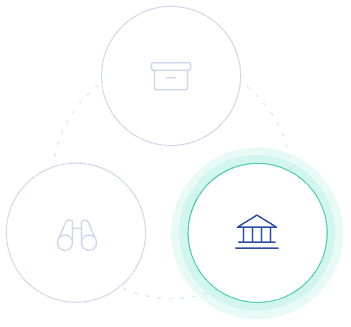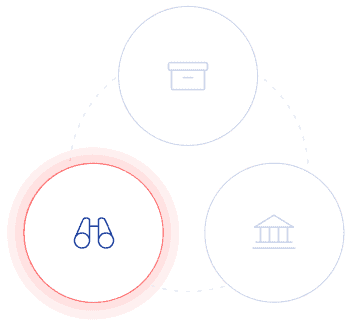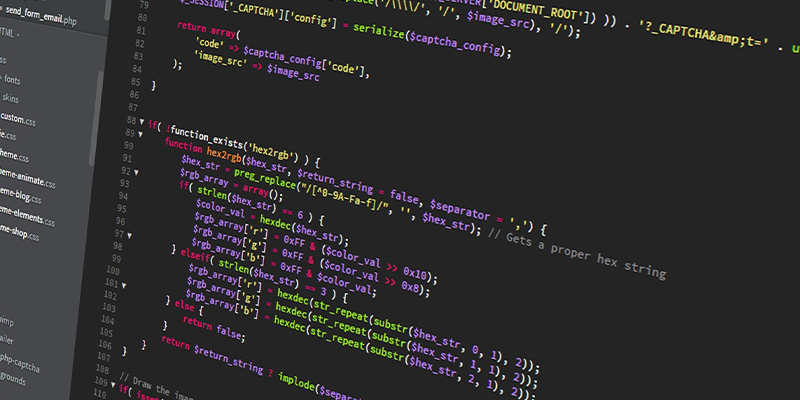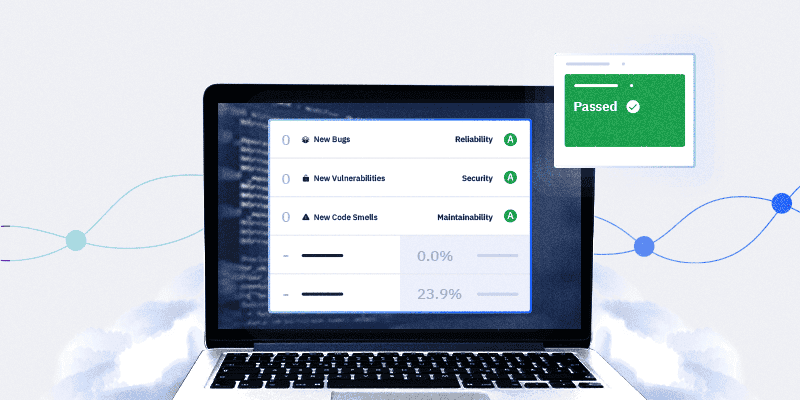Salesforce Security Compliance Tools:
Governance and Accountability
CodeScan’s Salesforce Security Posture Management capabilities governs organizational policies by enforcing the
security and compliance rules mandated for your
Salesforce environment.
security and compliance rules mandated for your
Salesforce environment.
Putting Control Back Into Your Hands
Unfortunately, companies often fall out of compliance with the rules and policies they put in place. Salesforce security posture management provides the visibility you need to avoid audits, security issues, and the loss of proprietary information.
- An interactive dashboard is created at the end of each scan that identifies your compliance score and any areas of concern—saving you time and money.
- Salesforce security posture management addresses metadata rules in areas of your Salesforce environment that need it most—such as profiles, customer data, permission sets, user permissions, and session settings.
- Policy review progress is tracked, ensuring admins maintain governance control within their organization.
Guaranteed Adherence to Salesforce Rules and
Policies
Why put rules in place if you aren’t going to verify they are being followed? Salesforce security posture management provides the accountability you need to remain in compliance with important rules and policies.
Comprehensive Overview
A thorough understanding of what your Salesforce org contains informs the rules and best practices you need to follow.
Establish Unique Standards
Customizations and add-ons require policies that won’t apply to anybody besides you.
Easily Locate and Enforce Standards
Pre-established rules and policies exist within your Salesforce environment and need to be addressed.
Salesforce Security Posture Management Product Features
The number of managed packages and apps available as add-ons to your Salesforce platform continues to expand every year. This is great because the technology provides additional functionality, but it can also lead to an unmanageable influx of metadata, rules, and permission sets. Salesforce Security Posture Management helps you sift through these settings so nothing falls between the cracks.
Enhanced Organization
Expanded metadata rules specifically address profiles, permission sets, user settings, session settings, and flow.
Reliable Analysis
Integration of new UI elements for analysis of metadata rules.
Complete Visibility
Personalized dashboards display findings for easy reporting, tracking, and analysis.
Expanded Access
Straightforward functionality doesn’t require coding knowledge, making it usable by system administrators, low-code developers, and more.
MuleScan
Analyze the security settings of Mulesoft configuration files to ensure vulnerabilities aren’t introduced into your system.
Inventory Management
You don’t have to be a developer with 20 years of experience to understand the intricacies of your Salesforce environment. With Salesforce security posture management, you can:
- Utilize an easy-to-use, no-code interface that admins, low-code developers, and anyone else who needs to verify adherence to policies can navigate.
- Examine compliance requirements and receive alerts the moment something doesn’t match up.
- Address internal rules, Salesforce-native rules, and any other policies impacting your environment.

Governance
The settings that make up your governance strategy can fall out of sync with your standards. Salesforce security posture management offers:
- 100% adherence to native and custom Salesforce policies while also helping you keep everything consistent.
- Immediate notifications and explanations of specific policy failures.
- Permissions, rules, and settings that can be homogenized so you don’t have to worry about overexposure of important data.

Analysis
Finding data sets only gives you something to store. You also need to be able to interpret that information in order to benefit from it. Salesforce security posture management allows you to:
- Gather actionable information that can be used to address current needs and establish policies and procedures to provide continued coverage.
- Define policy parameters and assess your team’s ability to meet preset standards.
- Utilize specialized dashboards and reports that provide detailed information about the success and failures regarding the enforcement of your policies.

Our Hosting Options
SELF-HOSTED
Check your code for data protection and quality with the most extensive database for the Salesforce platform.
CLOUD
Get all the benefits of our self-hosted service without the need for servers or internal infrastructure.
Editor Plugins
Plug in CodeScan to your favorite
editor and get real-time feedback
while you code.
Related Blog Posts
Addressing Metadata in Salesforce Security Posture Management
Josh RankApr 5 2023Metadata security is an important factor in maintaining reliable functionality in your Salesforce environment. A comprehensive approach is essential to preserving the integrity of this important pool of data. Why9 Salesforce Best Practices to Prevent Common Security Risks
Josh RankAug 9 2023Salesforce best practices provide a road map to secure behaviors that will help teams avoid data security issues when uniformly followed. Why It Matters: Security breaches threaten system data, regulatory9 Salesforce Security Vulnerabilities Addressed with Automation
Josh RankMay 31 2023Integrate automated tools to address Salesforce vulnerabilities and protect critical system data. Why It Matters: Salesforce itself is a secure platform but the way we use it has the potentialHow to Leverage a Code Analysis Tool for Cybersecurity
Josh RankMar 8 2023A code analysis tool can improve the quality of your applications and updates, which also leads to a stronger data security strategy. Why It Matters: The DevOps tools you useShould Static Code Analysis Be Used as a Salesforce Monitoring Tool For Security?
Josh RankMay 11 2022Should Your Salesforce Monitoring Tools Include Static Code Analysis for Security? Ensuring Code Quality + Security Static code analysis is crucial to identifying weaknesses in source code and code quality.Does a Salesforce Security Scanner Impact Code?
Josh RankMar 2 2022Data security is a constant concern. There are ever-evolving threats that have the potential to impact the stability of your system, privacy of your customers, and your company’s ability toHow a Salesforce Code Scanner Boosts Data Security
Josh RankJan 5 2022Data security needs to be a major concern for all Salesforce developers. The applications and updates you produce can either guard against or create potential security risks. Buggy or malfunctioning8 Essential DevSecOps Security Tools
Josh RankJun 8 2022Salesforce DevSecOps security tools are an essential aspect of properly securing your Salesforce environment and producing applications and updates that support your data security strategy. Why It Matters: Traditionally, securityUsing a Security Code Scan to Fill Salesforce’s Gaps
Josh RankMay 17 2023Automated scans of critical Salesforce considerations address common problems to support data security and regulatory compliance. Why It Matters: Salesforce is a secure platform, but the addition of any customizationsHealthcare Cybersecurity Solutions Beyond Code Scan Tools
Josh RankMar 22 2023Healthcare companies must ensure the highest level of cybersecurity protection because of the sensitivity of the data they handle. Why It Matters: A successful cybersecurity strategy includes the efforts ofIf You Aren’t Using Salesforce Monitoring Tools, Your Data Is at Risk
Josh RankSep 6 2023Visibility into your DevOps pipeline helps prevent and address data security risks. Salesforce monitoring tools provide the support you need to accomplish this. Why It Matters: Hidden breaches, unseen vulnerabilities,Consider This for Your Next Salesforce Security Scan
Josh RankFeb 8 2023Proper planning and attention significantly increase the effectiveness of a Salesforce security scan, making it easier to achieve compliance with data security regulations and avoid costly data breaches. Why ItGitHub Shifts Left on Security with Its SARIF Compatibility
Josh RankOct 5 2020SARIF stands for Static Analysis Results Interchange Format. In 2018, SARIF was announced as an OASIS standard when it comes to detecting software vulnerabilities. Since, governments and large corporations like
Develop high quality, secure code!











